Analysis of McDonald's Social Media Campaign Failure and Future Plans
VerifiedAdded on 2023/06/07
|6
|1259
|300
Report
AI Summary
This report, written as a memo from Rick Wion, the Social Media Manager, to McDonald's management, analyzes the viability of social media use for the corporation. It begins by outlining the advantages of social media, such as cost-effectiveness, various techniques, wide coverage, and recruitment potential, while also acknowledging disadvantages like management responsibilities and time intensiveness. The memo then focuses on the failure of McDonald's 2012 Twitter campaign, attributing it to a disconnect between the company's perception and customer perception. It emphasizes the need to understand customer preferences and societal trends. Finally, it proposes a communication plan, including timing, target audience, key messages, and desired outcomes, to guide future social media campaigns, especially during festive seasons and holidays, aiming to connect with a broad audience through platforms like Facebook and Twitter, focusing on the themes of food, fun, and happiness.
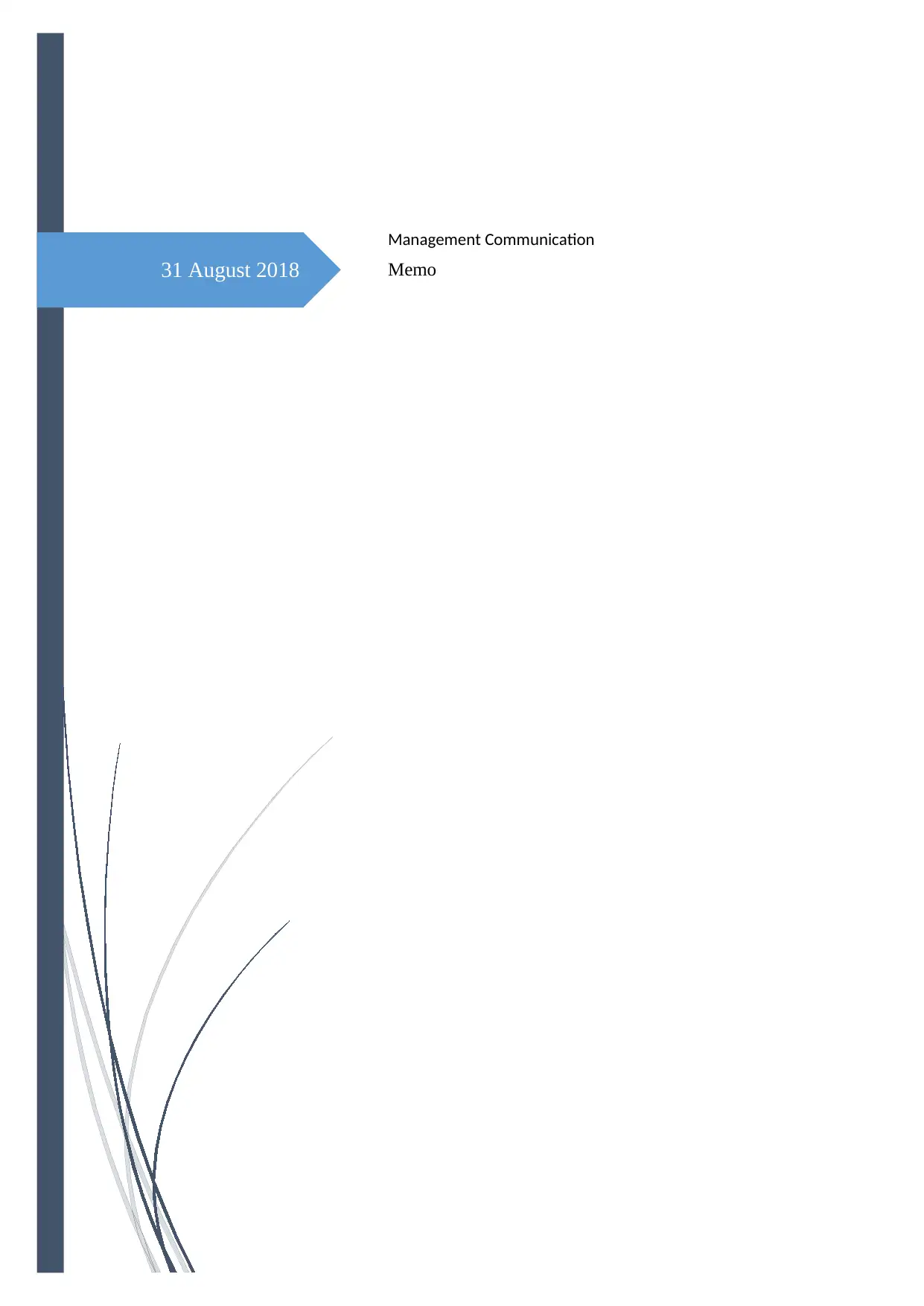
31 August 2018
Management Communication
Memo
Management Communication
Memo
Paraphrase This Document
Need a fresh take? Get an instant paraphrase of this document with our AI Paraphraser
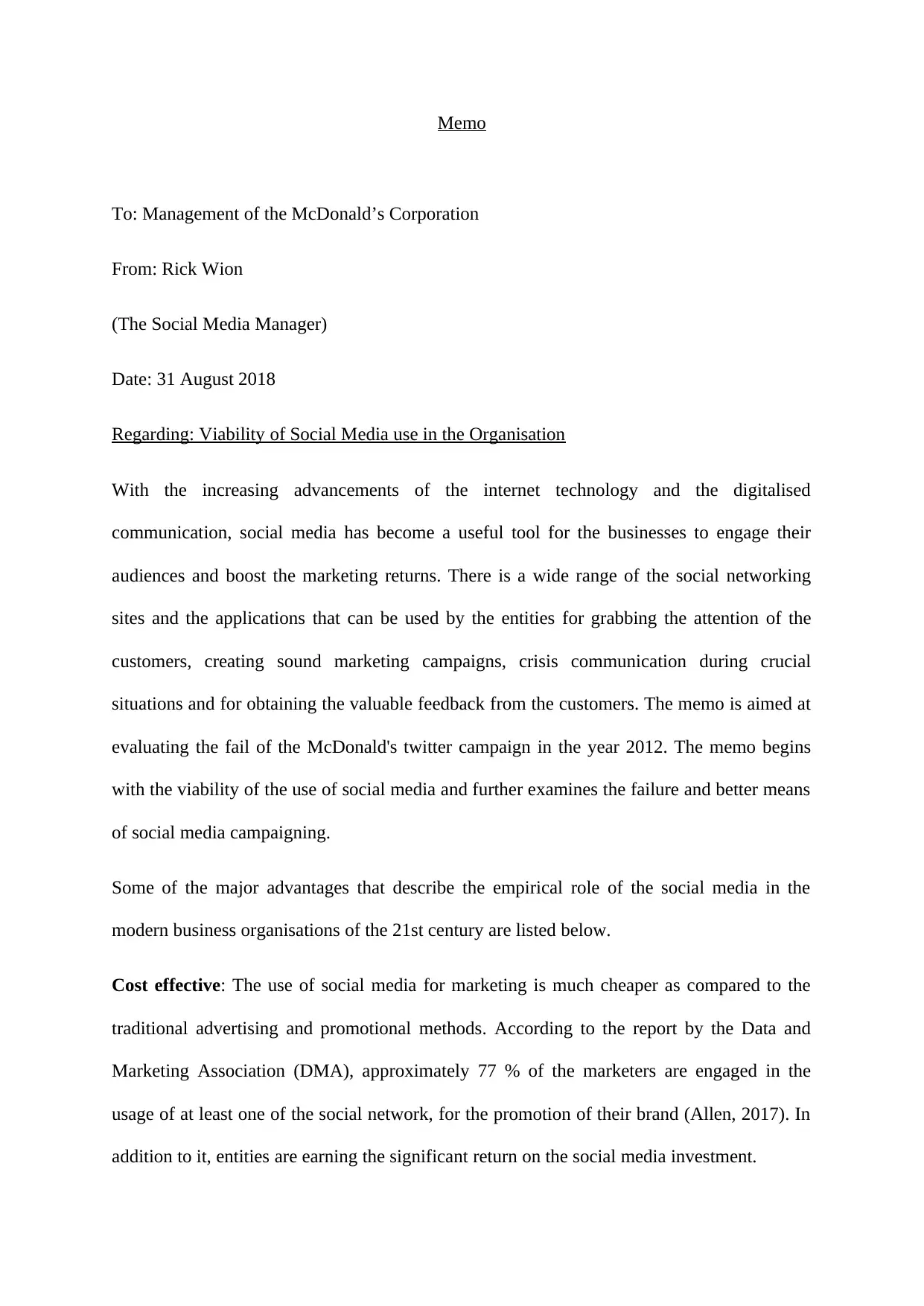
Memo
To: Management of the McDonald’s Corporation
From: Rick Wion
(The Social Media Manager)
Date: 31 August 2018
Regarding: Viability of Social Media use in the Organisation
With the increasing advancements of the internet technology and the digitalised
communication, social media has become a useful tool for the businesses to engage their
audiences and boost the marketing returns. There is a wide range of the social networking
sites and the applications that can be used by the entities for grabbing the attention of the
customers, creating sound marketing campaigns, crisis communication during crucial
situations and for obtaining the valuable feedback from the customers. The memo is aimed at
evaluating the fail of the McDonald's twitter campaign in the year 2012. The memo begins
with the viability of the use of social media and further examines the failure and better means
of social media campaigning.
Some of the major advantages that describe the empirical role of the social media in the
modern business organisations of the 21st century are listed below.
Cost effective: The use of social media for marketing is much cheaper as compared to the
traditional advertising and promotional methods. According to the report by the Data and
Marketing Association (DMA), approximately 77 % of the marketers are engaged in the
usage of at least one of the social network, for the promotion of their brand (Allen, 2017). In
addition to it, entities are earning the significant return on the social media investment.
To: Management of the McDonald’s Corporation
From: Rick Wion
(The Social Media Manager)
Date: 31 August 2018
Regarding: Viability of Social Media use in the Organisation
With the increasing advancements of the internet technology and the digitalised
communication, social media has become a useful tool for the businesses to engage their
audiences and boost the marketing returns. There is a wide range of the social networking
sites and the applications that can be used by the entities for grabbing the attention of the
customers, creating sound marketing campaigns, crisis communication during crucial
situations and for obtaining the valuable feedback from the customers. The memo is aimed at
evaluating the fail of the McDonald's twitter campaign in the year 2012. The memo begins
with the viability of the use of social media and further examines the failure and better means
of social media campaigning.
Some of the major advantages that describe the empirical role of the social media in the
modern business organisations of the 21st century are listed below.
Cost effective: The use of social media for marketing is much cheaper as compared to the
traditional advertising and promotional methods. According to the report by the Data and
Marketing Association (DMA), approximately 77 % of the marketers are engaged in the
usage of at least one of the social network, for the promotion of their brand (Allen, 2017). In
addition to it, entities are earning the significant return on the social media investment.
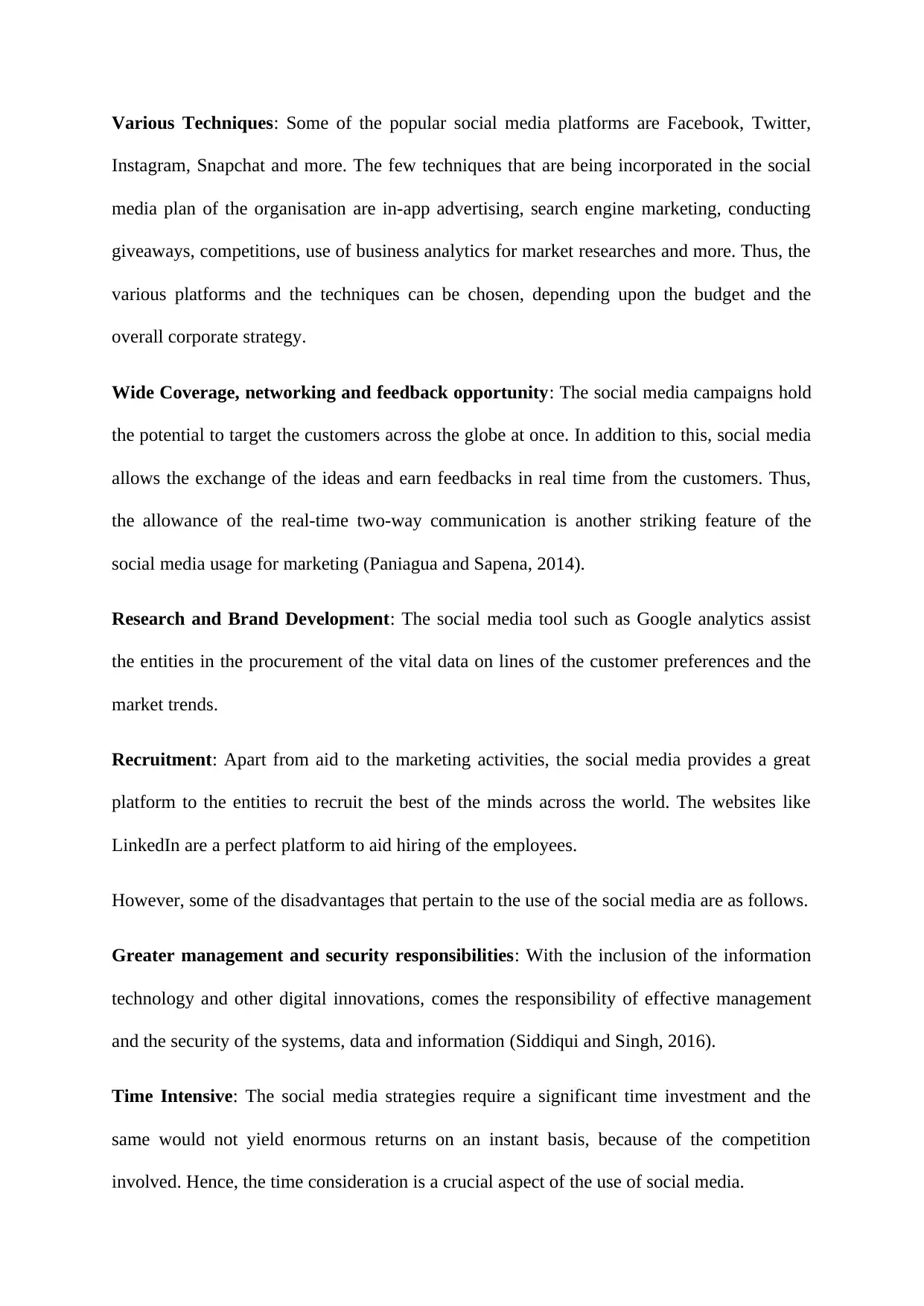
Various Techniques: Some of the popular social media platforms are Facebook, Twitter,
Instagram, Snapchat and more. The few techniques that are being incorporated in the social
media plan of the organisation are in-app advertising, search engine marketing, conducting
giveaways, competitions, use of business analytics for market researches and more. Thus, the
various platforms and the techniques can be chosen, depending upon the budget and the
overall corporate strategy.
Wide Coverage, networking and feedback opportunity: The social media campaigns hold
the potential to target the customers across the globe at once. In addition to this, social media
allows the exchange of the ideas and earn feedbacks in real time from the customers. Thus,
the allowance of the real-time two-way communication is another striking feature of the
social media usage for marketing (Paniagua and Sapena, 2014).
Research and Brand Development: The social media tool such as Google analytics assist
the entities in the procurement of the vital data on lines of the customer preferences and the
market trends.
Recruitment: Apart from aid to the marketing activities, the social media provides a great
platform to the entities to recruit the best of the minds across the world. The websites like
LinkedIn are a perfect platform to aid hiring of the employees.
However, some of the disadvantages that pertain to the use of the social media are as follows.
Greater management and security responsibilities: With the inclusion of the information
technology and other digital innovations, comes the responsibility of effective management
and the security of the systems, data and information (Siddiqui and Singh, 2016).
Time Intensive: The social media strategies require a significant time investment and the
same would not yield enormous returns on an instant basis, because of the competition
involved. Hence, the time consideration is a crucial aspect of the use of social media.
Instagram, Snapchat and more. The few techniques that are being incorporated in the social
media plan of the organisation are in-app advertising, search engine marketing, conducting
giveaways, competitions, use of business analytics for market researches and more. Thus, the
various platforms and the techniques can be chosen, depending upon the budget and the
overall corporate strategy.
Wide Coverage, networking and feedback opportunity: The social media campaigns hold
the potential to target the customers across the globe at once. In addition to this, social media
allows the exchange of the ideas and earn feedbacks in real time from the customers. Thus,
the allowance of the real-time two-way communication is another striking feature of the
social media usage for marketing (Paniagua and Sapena, 2014).
Research and Brand Development: The social media tool such as Google analytics assist
the entities in the procurement of the vital data on lines of the customer preferences and the
market trends.
Recruitment: Apart from aid to the marketing activities, the social media provides a great
platform to the entities to recruit the best of the minds across the world. The websites like
LinkedIn are a perfect platform to aid hiring of the employees.
However, some of the disadvantages that pertain to the use of the social media are as follows.
Greater management and security responsibilities: With the inclusion of the information
technology and other digital innovations, comes the responsibility of effective management
and the security of the systems, data and information (Siddiqui and Singh, 2016).
Time Intensive: The social media strategies require a significant time investment and the
same would not yield enormous returns on an instant basis, because of the competition
involved. Hence, the time consideration is a crucial aspect of the use of social media.
⊘ This is a preview!⊘
Do you want full access?
Subscribe today to unlock all pages.

Trusted by 1+ million students worldwide
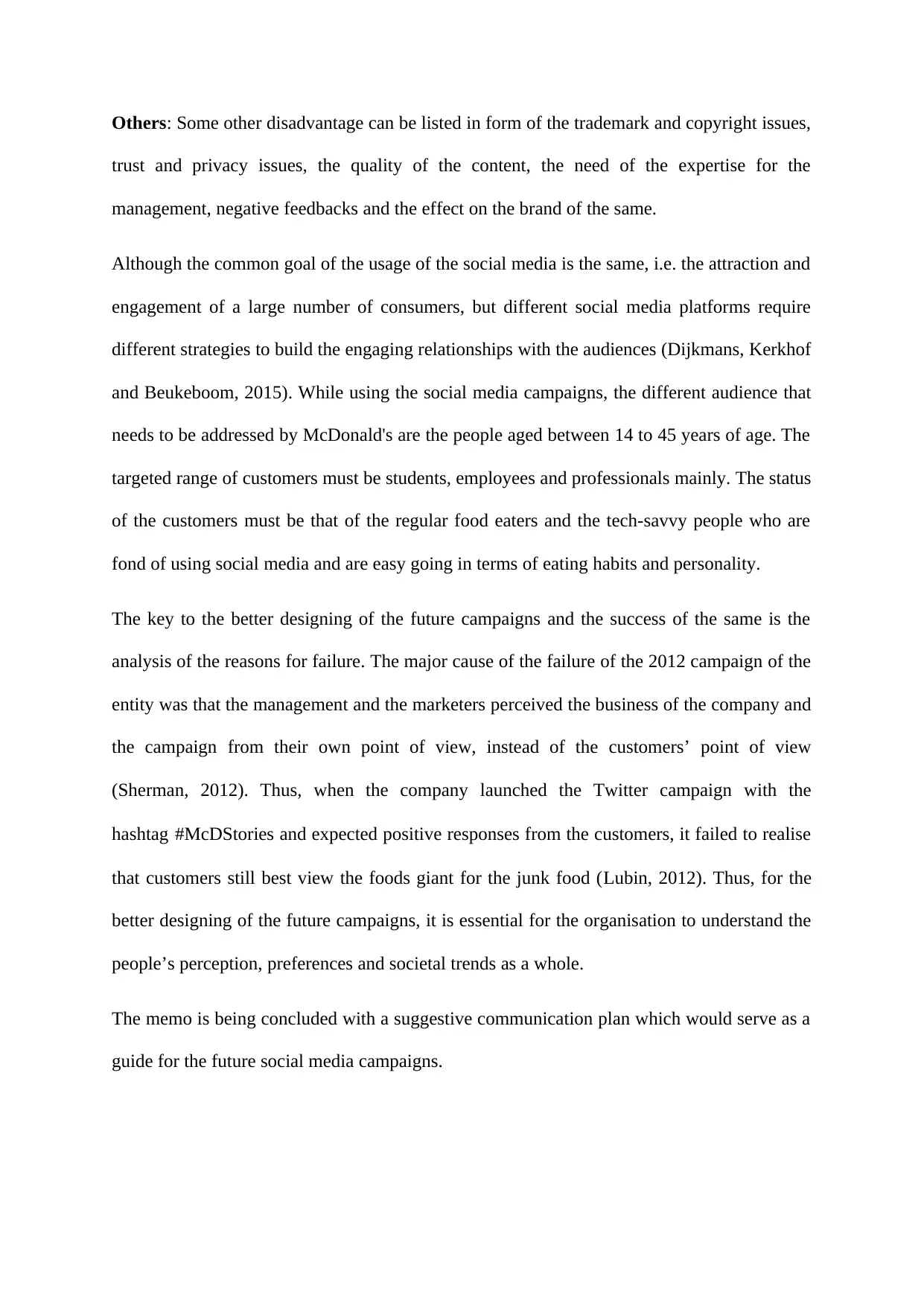
Others: Some other disadvantage can be listed in form of the trademark and copyright issues,
trust and privacy issues, the quality of the content, the need of the expertise for the
management, negative feedbacks and the effect on the brand of the same.
Although the common goal of the usage of the social media is the same, i.e. the attraction and
engagement of a large number of consumers, but different social media platforms require
different strategies to build the engaging relationships with the audiences (Dijkmans, Kerkhof
and Beukeboom, 2015). While using the social media campaigns, the different audience that
needs to be addressed by McDonald's are the people aged between 14 to 45 years of age. The
targeted range of customers must be students, employees and professionals mainly. The status
of the customers must be that of the regular food eaters and the tech-savvy people who are
fond of using social media and are easy going in terms of eating habits and personality.
The key to the better designing of the future campaigns and the success of the same is the
analysis of the reasons for failure. The major cause of the failure of the 2012 campaign of the
entity was that the management and the marketers perceived the business of the company and
the campaign from their own point of view, instead of the customers’ point of view
(Sherman, 2012). Thus, when the company launched the Twitter campaign with the
hashtag #McDStories and expected positive responses from the customers, it failed to realise
that customers still best view the foods giant for the junk food (Lubin, 2012). Thus, for the
better designing of the future campaigns, it is essential for the organisation to understand the
people’s perception, preferences and societal trends as a whole.
The memo is being concluded with a suggestive communication plan which would serve as a
guide for the future social media campaigns.
trust and privacy issues, the quality of the content, the need of the expertise for the
management, negative feedbacks and the effect on the brand of the same.
Although the common goal of the usage of the social media is the same, i.e. the attraction and
engagement of a large number of consumers, but different social media platforms require
different strategies to build the engaging relationships with the audiences (Dijkmans, Kerkhof
and Beukeboom, 2015). While using the social media campaigns, the different audience that
needs to be addressed by McDonald's are the people aged between 14 to 45 years of age. The
targeted range of customers must be students, employees and professionals mainly. The status
of the customers must be that of the regular food eaters and the tech-savvy people who are
fond of using social media and are easy going in terms of eating habits and personality.
The key to the better designing of the future campaigns and the success of the same is the
analysis of the reasons for failure. The major cause of the failure of the 2012 campaign of the
entity was that the management and the marketers perceived the business of the company and
the campaign from their own point of view, instead of the customers’ point of view
(Sherman, 2012). Thus, when the company launched the Twitter campaign with the
hashtag #McDStories and expected positive responses from the customers, it failed to realise
that customers still best view the foods giant for the junk food (Lubin, 2012). Thus, for the
better designing of the future campaigns, it is essential for the organisation to understand the
people’s perception, preferences and societal trends as a whole.
The memo is being concluded with a suggestive communication plan which would serve as a
guide for the future social media campaigns.
Paraphrase This Document
Need a fresh take? Get an instant paraphrase of this document with our AI Paraphraser
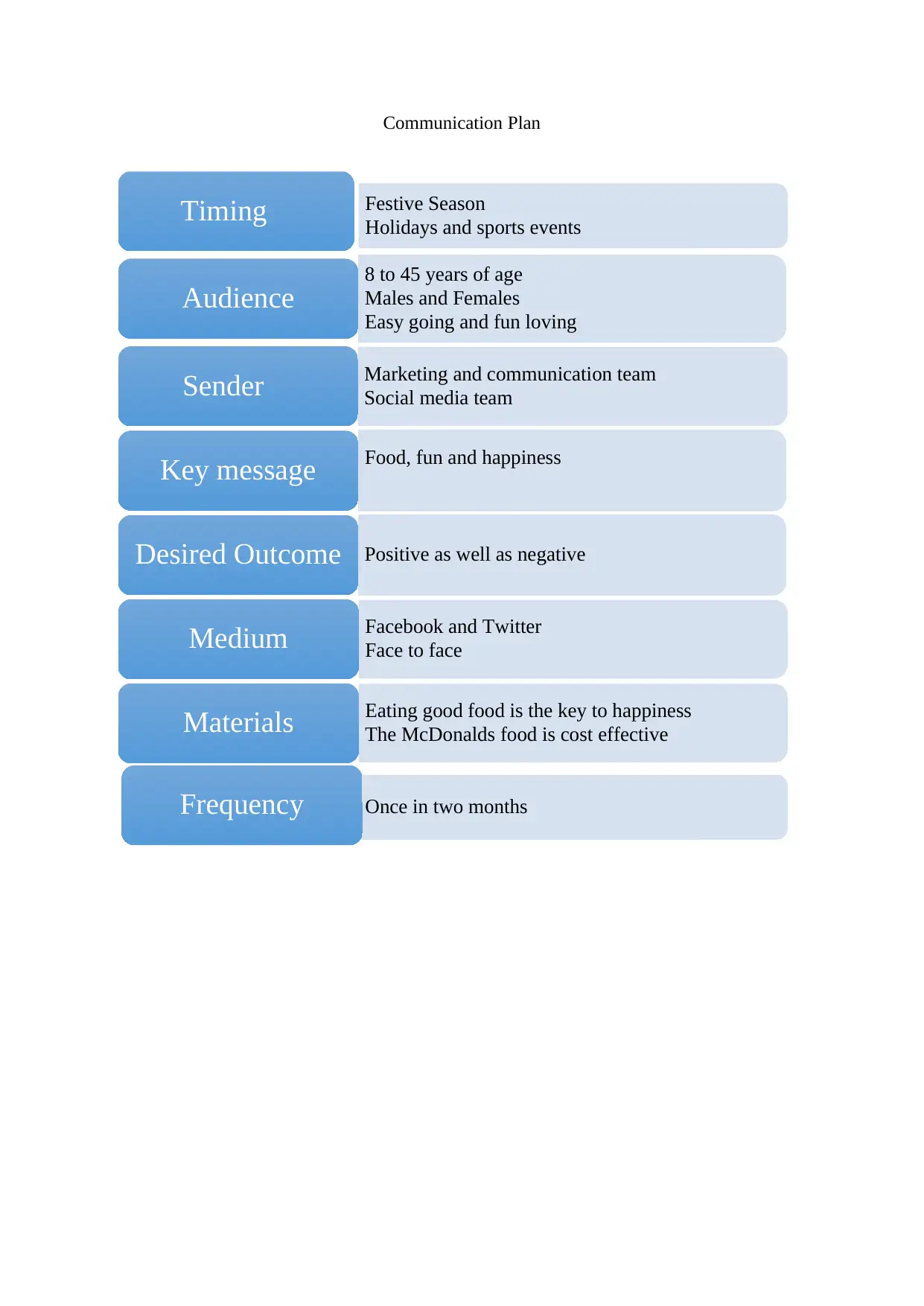
Communication Plan
Festive Season
Holidays and sports events
Timing
8 to 45 years of age
Males and Females
Easy going and fun loving
Audience
Marketing and communication team
Social media teamSender
Food, fun and happiness
Key message
Positive as well as negativeDesired Outcome
Facebook and Twitter
Face to faceMedium
Eating good food is the key to happiness
The McDonalds food is cost effectiveMaterials
Once in two monthsFrequency
Festive Season
Holidays and sports events
Timing
8 to 45 years of age
Males and Females
Easy going and fun loving
Audience
Marketing and communication team
Social media teamSender
Food, fun and happiness
Key message
Positive as well as negativeDesired Outcome
Facebook and Twitter
Face to faceMedium
Eating good food is the key to happiness
The McDonalds food is cost effectiveMaterials
Once in two monthsFrequency
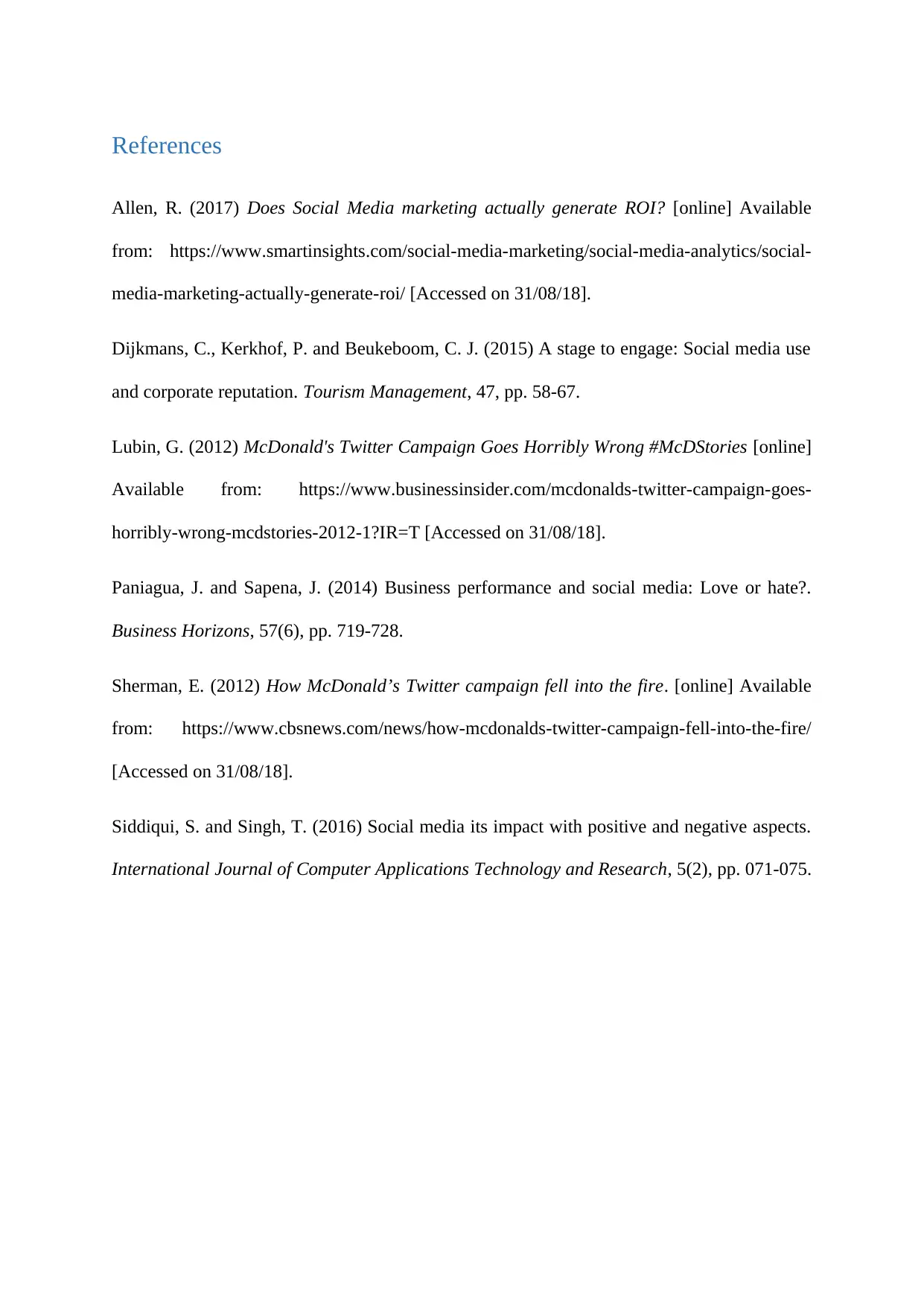
References
Allen, R. (2017) Does Social Media marketing actually generate ROI? [online] Available
from: https://www.smartinsights.com/social-media-marketing/social-media-analytics/social-
media-marketing-actually-generate-roi/ [Accessed on 31/08/18].
Dijkmans, C., Kerkhof, P. and Beukeboom, C. J. (2015) A stage to engage: Social media use
and corporate reputation. Tourism Management, 47, pp. 58-67.
Lubin, G. (2012) McDonald's Twitter Campaign Goes Horribly Wrong #McDStories [online]
Available from: https://www.businessinsider.com/mcdonalds-twitter-campaign-goes-
horribly-wrong-mcdstories-2012-1?IR=T [Accessed on 31/08/18].
Paniagua, J. and Sapena, J. (2014) Business performance and social media: Love or hate?.
Business Horizons, 57(6), pp. 719-728.
Sherman, E. (2012) How McDonald’s Twitter campaign fell into the fire. [online] Available
from: https://www.cbsnews.com/news/how-mcdonalds-twitter-campaign-fell-into-the-fire/
[Accessed on 31/08/18].
Siddiqui, S. and Singh, T. (2016) Social media its impact with positive and negative aspects.
International Journal of Computer Applications Technology and Research, 5(2), pp. 071-075.
Allen, R. (2017) Does Social Media marketing actually generate ROI? [online] Available
from: https://www.smartinsights.com/social-media-marketing/social-media-analytics/social-
media-marketing-actually-generate-roi/ [Accessed on 31/08/18].
Dijkmans, C., Kerkhof, P. and Beukeboom, C. J. (2015) A stage to engage: Social media use
and corporate reputation. Tourism Management, 47, pp. 58-67.
Lubin, G. (2012) McDonald's Twitter Campaign Goes Horribly Wrong #McDStories [online]
Available from: https://www.businessinsider.com/mcdonalds-twitter-campaign-goes-
horribly-wrong-mcdstories-2012-1?IR=T [Accessed on 31/08/18].
Paniagua, J. and Sapena, J. (2014) Business performance and social media: Love or hate?.
Business Horizons, 57(6), pp. 719-728.
Sherman, E. (2012) How McDonald’s Twitter campaign fell into the fire. [online] Available
from: https://www.cbsnews.com/news/how-mcdonalds-twitter-campaign-fell-into-the-fire/
[Accessed on 31/08/18].
Siddiqui, S. and Singh, T. (2016) Social media its impact with positive and negative aspects.
International Journal of Computer Applications Technology and Research, 5(2), pp. 071-075.
⊘ This is a preview!⊘
Do you want full access?
Subscribe today to unlock all pages.

Trusted by 1+ million students worldwide
1 out of 6
Related Documents
Your All-in-One AI-Powered Toolkit for Academic Success.
+13062052269
info@desklib.com
Available 24*7 on WhatsApp / Email
![[object Object]](/_next/static/media/star-bottom.7253800d.svg)
Unlock your academic potential
Copyright © 2020–2026 A2Z Services. All Rights Reserved. Developed and managed by ZUCOL.



